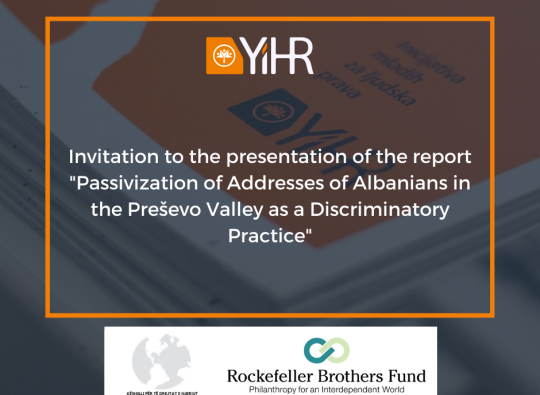Researchers of the YIHR Serbia conducted a report on the passivation of Serbian citizens of Albanian nationality from July to September this year in the municipalities of Bujanovac, Preševo and Medveđa. Based on interviews, as well as an insight into the decisions of the Ministry of Internal Affairs of Serbia (MUP) on the passivation of addresses, as well as on the basis of data on changes to voter lists and conversations with local activists and political parties, they came to the conclusion that 72% of respondents did not receive a decision on passivization but were only verbally informed, as well as that 80% of them lost their right to vote.
Two basic indicators that the MUP violates the Law on residence and temporary residence are inconsistent and non-transparent data on passivation by the police, as well as the fact that at least 3 370 Albanians in the Preševo Valley were deleted from the voter list in the period from 2015 to 2022.
“The passivization of addresses represents a type of political instrument that is misused to change the demographic and ethnic structure of the south of Serbia,” said Marko Milosavljević at the presentation of the report. Those who lose their address during this process are deprived of almost all their rights: they cannot get an identity card, get a job, get married, be elected or vote at the elections, register a car or own property. The paradox is that the victims of the abuse of the passivation process are often the owners or co-owners of properties, apartments and houses for which they properly pay taxes to the state. Even though their basic human rights are clearly threatened, Serbian officials have been denying it for years, while there is no precise official data on the number of people whose addresses have been deactivated.
Relja Pantić, Head of the Complaint Department in the professional service of the Commissioner for Protection of Equality, said that in the last annual report of this institution, complaints about discrimination are dominated by complaints about discrimination based on nationality, which is 16%. Of that, only one complaint is about discrimination against Albanians. He pointed out that this shows that the institution of the Commissioner must pay more attention to this issue since the research of the Youth Initiative for Human Rights shows different data and a much wider scope of discrimination.
YIHR Serbia calls on the competent prosecutor’s office as well as independent state bodies such as the Protector of Citizens to fully investigate the allegations in the report and prosecute those responsible. We request the Ministry of Internal Affairs of Serbia to publicly publish the statistics of citizens by ethnicity whose addresses were passivized from 2012 to 2023 in all municipalities of Serbia, including Bujanovac, Preševo and Medveđa.
The report is available to read in Serbian, English and Albanian here.
The report “Passivization of addresses of Albanians in the Preševo Valley as a discriminatory practice” was created as part of the project “Disclosure of discriminatory practices in the Preševo Valley” which was implemented by the Youth Initiative for Human Rights together with the Committee for Human Rights from Bujanovac with the support of the Rockefeller Brothers Fund from the United States of America.











